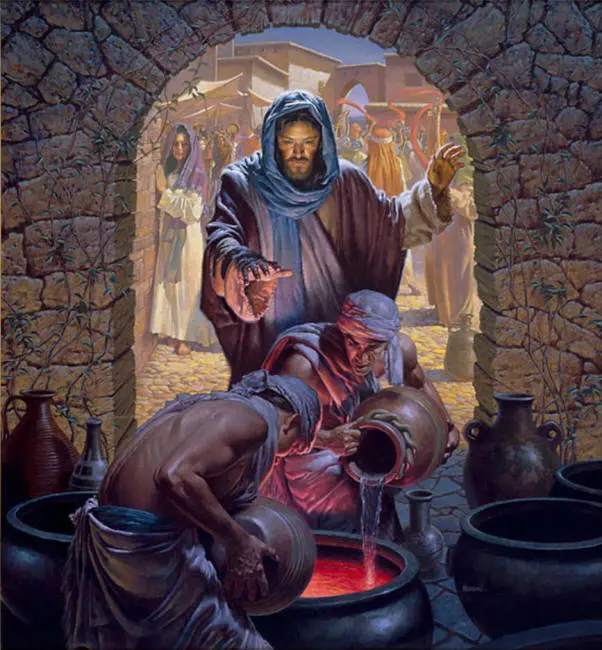What Does “I Have Been Called to Serve God” Mean?
In Christian theology, the phrase “I have been called to serve God” reflects a believer’s understanding that God has purposefully chosen and commissioned them to carry out His will. This calling is not merely an obligation but a divine invitation to participate in God’s redemptive plan. The Bible affirms this in passages such as:Romans 8:28–30 (NIV):
- “And we know that in all things God works for the good of those who love him, who have been called according to his purpose… And those he called, he also justified; those he justified, he also glorified.
- Ephesians 2:10 (NIV)
- “For we are God’s handiwork, created in Christ Jesus to do good works, which God prepared in advance for us to do.”
This calling can be general serving God in everyday life or specific, such as missionary work, pastoral ministry, or other forms of Christian service.
Biblical Cities in the New Testament
A List of Biblical Cities: Then and Now
(Using the New International Version, NIV)
The New Testament contains numerous references to cities that were central to the spread of Christianity. Understanding their modern locations helps us connect the biblical narrative with historical geography.
| Biblical Name | Biblical Reference (NIV) | Modern Name | Present-day Country |
|---|---|---|---|
| Antioch | Acts 11:26 | Antakya | Turkey |
| Caesarea | Acts 23:23 | Caesarea | Israel |
| Ephesus | Acts 19:35 | Selçuk | Turkey |
| Philippi | Acts 16:12 | Philippi | Greece |
| Thessalonica | Acts 17:1 | Thessaloniki | Greece |
The cities listed were key centers of early Christian preaching and missionary activity.
Biblical Cities in the Old Testament
A List of Biblical Cities: Then and Now
(Using the New International Version, NIV)
Many Old Testament events occurred in places with rich historical and theological significance.
| Biblical Name | Biblical Reference (NIV) | Modern Name | Present-day Country |
|---|---|---|---|
| Bethel | Genesis 28:19 | Beitin | Palestine |
| Ai | Joshua 7:2 | Deir Dibwan | Palestine |
| Shittim | Joshua 2:1 | Tall el-Hammam | Jordan |
These cities represent locations where God revealed Himself, gave instructions, or demonstrated His power.
The Apostles of Jesus
Names, Details, and Theological Significance
(New International Version, NIV)
Jesus’ apostles were personally called by Him to be His closest followers and to spread the Gospel after His resurrection. The calling of the apostles illustrates the divine commissioning of ordinary people for extraordinary mission (Mark 3:13-19, Acts 1:15-26).
| No. | Name | Other Names | Biblical Reference (NIV) | Role & Theological Note |
|---|---|---|---|---|
| 1 | Simon Peter | Cephas (John 1:42) | Matthew 16:18-19 | Called “the rock” on whom Jesus would build His church. |
| 2 | Andrew | — | John 1:40-42 | Brought others (including Peter) to Jesus; a “fisher of men.” |
| 3 | James | Son of Zebedee | Acts 12:1-2 | First apostolic martyr; part of Jesus’ inner circle. |
| 4 | John | “The beloved disciple” | John 21:20-24 | Author of Gospel, epistles, and Revelation; emphasis on love. |
| 5 | Matthew | Levi | Matthew 9:9 | Former tax collector; author of the first Gospel. |
| … | … | … | … | … |
The apostles’ lives demonstrate God’s calling to faith, discipleship, and mission.
Prophets of the Bible (Men)
Major Prophets and Their Historical Context
(NIV)
The prophets were God’s messengers, called to warn Israel and the nations, call for repentance, and foretell the coming Messiah. Their words shaped Israel’s history and the unfolding plan of salvation.
| No. | Name | Time & Kings | Audience | Theological Role |
|---|---|---|---|---|
| 1 | Elijah | Ahab, Ahaziah | Kingdom of Israel | Called people back to God’s covenant faithfulness (1 Kings 18). |
| 2 | Elisha | Jehoram, Jehu | Kingdom of Israel | Successor of Elijah; performed miracles demonstrating God’s power. |
| 3 | Jonah | Jeroboam II | Nineveh (Assyria) | Prophet of repentance and God’s mercy to Gentiles. |
| 4 | Isaiah | Uzziah, Hezekiah | Judah | Prophesied the coming Messiah and salvation (Isaiah 53). |
| 5 | Jeremiah | Josiah, Jehoiakim | Judah | Called for repentance before Babylonian exile; foretold New Covenant. |
| … | … | … | … | … |
Shalom.
What Are Constellations? A Biblical Perspective (Isaiah 13:10, ESV)
Answer: Let’s explore the Scriptures for understanding…
Isaiah 13:10 (ESV) says:
“For the stars of the heavens and their constellations will not give their light; the sun will be dark at its rising, and the moon will not shed its light.”
The word “constellations” here refers to groupings or arrangements of stars in the night sky that form recognizable patterns. These have been named and categorized by ancient astronomers and astrologers, often based on the shapes they appear to make like a scorpion (Scorpius), a lion (Leo), a bear (Ursa Major), or twins (Gemini).
To the natural eye, these are merely stars in the sky. But over time, humans connected these stars with lines and gave them symbolic meanings, creating a system known as the Zodiac. This is where astrology comes in.
Constellations and Astrology: A Biblical Warning
While astronomy (the scientific study of celestial bodies) can glorify God by revealing His handiwork (Psalm 19:1), astrology is something entirely different. It is the interpretation of celestial movements to predict or influence human affairs and Scripture strictly condemns it.
The practice of using constellations or “reading stars” to predict the future is part of astrology or, in some cultures, called “Falaki.” This is not a neutral science—it is spiritually dangerous. Astrology is rooted in paganism and occultism, and God repeatedly warns His people against such practices.
Isaiah 47:13–14 (ESV) says:
“You are wearied with your many counsels; let them stand forth and save you, those who divide the heavens, who gaze at the stars, who at the new moons make known what shall come upon you. Behold, they are like stubble; the fire consumes them…”
Here, God mocks the astrologers of Babylon, saying their predictions are worthless and will not save them from His judgment.
Similarly, in Deuteronomy 18:10–12 (ESV), God declares:
“There shall not be found among you anyone who… practices divination or tells fortunes or interprets omens… For whoever does these things is an abomination to the Lord.”
Astrology does not reveal your God-ordained future it entangles people in demonic deception. Instead of prophecy, people are unknowingly submitting to spiritual manipulation by the enemy.
Why Will the Constellations Go Dark?
In Isaiah 13:10, God speaks of a time when the stars and their constellations will no longer give their light, and the sun and moon will be darkened. This is a prophetic declaration of divine judgment a theme repeated throughout Scripture, especially in the Day of the Lord passages.
This cosmic imagery appears again in:
Joel 3:15 (ESV):
“The sun and the moon are darkened, and the stars withdraw their shining.”Mark 13:24–25 (ESV):
“But in those days, after that tribulation, the sun will be darkened, and the moon will not give its light, and the stars will be falling from heaven…”Matthew 24:29 (ESV):
“Immediately after the tribulation of those days the sun will be darkened, and the moon will not give its light, and the stars will fall from heaven…”Revelation 6:12–13 (ESV):
“…the sun became black as sackcloth, the full moon became like blood, and the stars of the sky fell to the earth…”
In all of these passages, God is showing that the very things humans have trusted in the heavens, the constellations, the sun and moon are under His authority. He will turn them off like lamps to show that He alone is sovereign.
A Loving Warning: Do Not Trust in Stars Trust in Christ
Many people today turn to horoscopes, astrologers, or spiritual “cleansings” to try to find hope or direction in life. But this is a false hope. God calls it an abomination (Deuteronomy 18), and it opens the door to spiritual bondage.
You do not need your “star read” or your “destiny unlocked” through mystics or astrologers. You need Jesus Christ.
Only Jesus can reveal your true purpose, cleanse your life from sin, and lead you into God’s will. He is the light of the world (John 8:12), and through Him, we are no longer in darkness.
Instead of seeking stars, seek the Savior.
Final Encouragement
Do not read horoscopes. Do not seek out spiritualists or astrologers. These practices are spiritual traps. Instead, turn to the Word of God, repent, and follow Jesus Christ. He is the only one who knows your future and He is the one who holds it.
May the Lord bless you.
Why Does Creation Seem to Be Repeated in Genesis Chapter 2?
The Apparent Problem
When reading Genesis chapters 1 and 2, many Bible readers notice what seems like a contradiction or repetition:Genesis 1 describes the full scope of creation in six days, ending with the creation of humanity and God’s rest on the seventh.Genesis 2, however, appears to retell the creation story again this time focusing on man, the Garden of Eden, and the creation of woman.
So is Genesis 2 a second creation account? Or is it simply a deeper explanation of the first?
Theological and Literary Clarification
1. Not Two Creations, But Two Perspectives
Genesis 1 and Genesis 2 are not contradictory; they are complementary.Genesis 1 is a cosmological and structured overview highlighting God’s transcendent power as Elohim (God), who creates by His Word.Genesis 2 is a zoomed-in narrative focusing on the relational and personal aspects of God’s work using Yahweh Elohim (the LORD God), which introduces His covenant name and intimate involvement.
This shift in divine names is theologically intentional:Elohim (Genesis 1): Emphasizes God’s omnipotence and sovereignty.Yahweh Elohim (Genesis 2): Emphasizes God’s relational nature, especially toward humanity.
Genesis 1:1 (NIV)
“In the beginning God (Elohim) created the heavens and the earth.”
Genesis 2:4 (NIV)
“This is the account of the heavens and the earth when they were created, when the Lord God (Yahweh Elohim) made the earth and the heavens.”
2. Structure and Purpose of Each Chapter
Genesis 1: The Grand Narrative of Creation
Genesis 1 is a theological account of order, where God forms the universe in six distinct days. It follows a pattern of forming and filling:Days 1–3: God forms the realms (light/darkness, sky/sea, land/vegetation).Days 4–6: God fills those realms (sun/moon/stars, birds/fish, animals/humans).
Genesis 1:27–28 (NIV)
“So God created mankind in his own image… male and female he created them. God blessed them and said, ‘Be fruitful and increase in number; fill the earth and subdue it.’”
This chapter emphasizes humanity’s dignity, identity, and vocation created in God’s image to rule and multiply.
Genesis 2: The Relational Detail of Humanity’s Origin
Genesis 2 doesn’t contradict Genesis 1; it explains in greater detail how the creation of humans occurred, especially highlighting the covenant relationship between God and humanity.
Genesis 2:7 (NIV)
“Then the LORD God formed a man from the dust of the ground and breathed into his nostrils the breath of life, and the man became a living being.”
This verse highlights:The material origin of man (dust),The spiritual nature of man (breath of life),The personal interaction of God with His creation.
3. Plants and People: Sequential, Not Conflicting
Some may cite Genesis 2:5–6 to argue that plants weren’t yet created, contradicting Genesis 1:11–12. But Genesis 2:5 is not denying that plants existed; it specifies a particular kind of cultivated vegetation the kind that requires human care and rainfall.
Genesis 2:5 (NIV)
“Now no shrub had yet appeared on the earth and no plant had yet sprung up, for the Lord God had not sent rain on the earth and there was no one to work the ground.”Genesis 1: Plants in general created (Hebrew: deshe vegetation).Genesis 2: No cultivated field plants or garden crops yet, because there was no rain or human labor (siach hasadeh field shrubs).
4. Woman’s Creation: From Overview to Specific Detail
Genesis 1:27 affirms that male and female were both created by God, in His image. Genesis 2 details how this took place: the woman was formed from the man’s side, emphasizing unity, mutual dependence, and complementarity.
Genesis 2:22 (NIV)
“Then the Lord God made a woman from the rib he had taken out of the man, and he brought her to the man.”
This is foundational for Christian theology on:Marriage (cf. Matthew 19:4–6),Unity in Christ (Galatians 3:28),The mystery of Christ and the Church (Ephesians 5:31–32).
Spiritual and Practical Applications
1. God’s Promises Often Come Through a Process
Genesis 1 is full of divine declarations “Let there be…” but Genesis 2 shows us that divine action unfolds through stages.
For example, the woman wasn’t instantly visible when God said He created them male and female she came later, from Adam’s rib.
Likewise, a tree doesn’t bear fruit immediately it starts as a seed, goes into the ground, decays, receives water, sprouts, and grows.
John 12:24 (NIV)
“Unless a kernel of wheat falls to the ground and dies, it remains only a single seed. But if it dies, it produces many seeds.”
2. Waiting Doesn’t Mean God Isn’t Working
We are often impatient for God’s promises. But Genesis 2 teaches that waiting is part of His design. Just like Joseph endured slavery and prison before ruling Egypt (Genesis 37–41), or Abraham waited years before Isaac was born (Genesis 15–21), the promise may linger, but it will come.
Habakkuk 2:3 (NIV)
“Though it linger, wait for it; it will certainly come and will not delay.”
Romans 8:25 (NIV)
“But if we hope for what we do not yet have, we wait for it patiently.”
3. The Fullness of God’s Revelation Requires Both Chapters
Genesis 1 teaches us to believe God’s power and purpose.
Genesis 2 teaches us to trust God’s process and timing.
Together, they reveal a God who is both majestic and intimately involved, sovereign and personal, powerful and compassionate.
Final Exhortation
Don’t just live in Genesis 1, believing God can speak things into existence.
Also live in Genesis 2, trusting how He brings them to pass.
Philippians 1:6 (NIV)
“Being confident of this, that he who began a good work in you will carry it on to completion until the day of Christ Jesus.”
So if you’ve received a word, a vision, or a promise be patient. The seed may appear to die, but life is taking root. What God started, He will finish.
The LORD bless you.
Why Is the Bible the Word of God?Question: Is it really true that the Bible is the Word of God?
Before we answer why the Bible is the Word of God and not just another religious or historical book it’s important to reflect on what makes it unique among all writings.
The Bible is the Word of God because it is divinely inspired. That means it wasn’t authored by human will alone, but written under the guidance of the Holy Spirit. Scripture confirms this in:
2 Timothy 3:16–17 (ESV):
“All Scripture is breathed out by God and profitable for teaching, for reproof, for correction, and for training in righteousness, that the man of God may be complete, equipped for every good work.”
The Bible isn’t just an ancient text it contains living and active truth:
Hebrews 4:12 (ESV):
“For the word of God is living and active, sharper than any two-edged sword, piercing to the division of soul and of spirit, of joints and of marrow, and discerning the thoughts and intentions of the heart.”
It holds divine authority and eternal relevance because it reveals who God is, what His will is, and most importantly His plan to save humankind from sin through Jesus Christ. No other book on earth offers this message of redemption and eternal life.
The Central Message: Salvation Through Christ
The Bible’s central message is the gospel the good news that we can be saved from sin through Jesus Christ. This salvation is not earned by human effort, but given as a gift of grace to those who believe.
Romans 6:23 (ESV):
“For the wages of sin is death, but the free gift of God is eternal life in Christ Jesus our Lord.”
Sin separates humanity from God. All have sinned (Romans 3:23), and no amount of good deeds can remove the guilt of sin. But through Jesus’ death and resurrection, forgiveness and eternal life are now available to all who respond in faith.
Other religious or philosophical writings may promote moral living or ethical values, but only the Bible reveals God’s direct solution for sin through the cross and resurrection of Jesus Christ.
How Can Someone Be Forgiven and Saved?
When the people of Jerusalem heard Peter preach about Jesus on the Day of Pentecost, they were convicted of their sin and asked what they should do. Peter responded with a clear call to repentance and baptism:
Acts 2:36–38 (ESV):
“Let all the house of Israel therefore know for certain that God has made him both Lord and Christ, this Jesus whom you crucified.”
Now when they heard this they were cut to the heart, and said to Peter and the rest of the apostles, “Brothers, what shall we do?”
And Peter said to them, “Repent and be baptized every one of you in the name of Jesus Christ for the forgiveness of your sins, and you will receive the gift of the Holy Spirit.”
This is the pattern established by the early Church:Repentance (a sincere turning away from sin)Baptism in water (by full immersion)In the name of Jesus ChristReceiving the Holy Spirit
Mark 16:16 (ESV):
“Whoever believes and is baptized will be saved, but whoever does not believe will be condemned.”
John 3:23 (ESV):
“John also was baptizing at Aenon near Salim, because water was plentiful there…”
(indicating baptism by immersion)
Acts 8:16 (ESV):
“…they had only been baptized in the name of the Lord Jesus.”
Acts 19:5 (ESV):
“On hearing this, they were baptized in the name of the Lord Jesus.”
True repentance is not just sorrow it’s a decision to completely turn from sin and surrender to Jesus. True baptism is not a ritual; it’s an act of obedience, symbolizing death to the old life and resurrection into new life in Christ (Romans 6:3–4).
John 5:24 (ESV):
“Truly, truly, I say to you, whoever hearsmy word and believes him who sent me has eternal life. He does not come into judgment, but has passed from death to life.”
May the Lord Jesus bless you.
LORD, GIVE ME STRENGTH ONCE MORE
Judges 16:28 (NKJV):
“Then Samson called to the Lord, saying, ‘O Lord God, remember me, I pray! Strengthen me, I pray, just this once, O God, that I may with one blow take vengeance on the Philistines for my two eyes!’”
Samson’s final prayer was not about regaining his hair it was about avenging the loss of his eyes. This is significant. His request reveals that vision not strength was his greatest loss. Strength can be regained, as seen in this story, but when vision is taken away, a person loses direction, clarity, and purpose. That is why Satan didn’t simply want to weaken Samson he wanted to blind him.
If Samson had to choose between his strength and his sight, he would have chosen to keep his eyes. And that choice reflects something deeply spiritual: vision precedes power. You can be strong, but if you have no spiritual vision, you’ll misuse your strength or serve the wrong purpose.
The Strategy of the Enemy: Weakening Vision by First Attacking Strength
Satan’s strategy with Samson is one he still uses today. He first weakens your spiritual strength your prayer life, your worship, your study of the Word and once you’re spiritually weak, he aims to blind your spiritual eyes. Why? Because without spiritual vision:You can’t discern truth from deceptionYou lose awareness of God’s directionYou no longer see the enemy’s traps
This is exactly what happened to Samson. Once blind, he was made to grind grain in the prison the same strength that once defeated armies was now being used for slavery.
Spiritual Blindness in the New Testament
2 Corinthians 4:4 (NKJV):
“Whose minds the god of this age has blinded, who do not believe, lest the light of the gospel of the glory of Christ, who is the image of God, should shine on them.”
Paul writes that Satan blinds the minds of unbelievers, preventing them from seeing the light of the gospel. But the principle applies even among believers when they drift from God they begin to lose their spiritual sensitivity and vision.
Greater Grace in the New Covenant
Here’s the good news: while Samson’s strength was restored, his sight never returned. But under the New Covenant through Christ, God doesn’t just renew your strength He also restores your spiritual vision.
Ephesians 1:18 (NKJV):
“The eyes of your understanding being enlightened; that you may know what is the hope of His calling, what are the riches of the glory of His inheritance in the saints.”
Paul prays that the eyes of our hearts would be enlightened because to walk in God’s purpose, we need clarity of vision, not just spiritual gifts or strength.
Signs of Spiritual Blindness and Weakness
Ask yourself:Has your prayer life grown cold?Do you find it hard to fast or seek God intentionally?Have you lost the passion to serve God?
These are not just signs of fatigue they can be symptoms of spiritual blindness. When you stop seeing what God is doing or stop feeling His leading, the enemy may have begun to dim your spiritual vision.
A Call to Humility and Renewal
But just as Samson humbled himself before God, so can we. And unlike Samson, we are under a covenant of grace and restoration. If we sincerely seek God, He will not only return our strength He will restore our sight.
Judges 16:28 (NKJV):
“Then Samson called to the Lord, saying, ‘O Lord God, remember me, I pray! Strengthen me, I pray, just this once, O God…’”
This is the prayer of total surrender. Samson knew he couldn’t fix himself. His restoration required divine intervention and so does ours.
Pray and Fast if You Can
If you are in a place where your vision or strength is gone, take time to pray sincerely. If possible, fast. In Scripture, fasting was often a sign of repentance, humility, and deeper pursuit of God’s voice. (See Joel 2:12, Matthew 6:16-18.)
God is not just able to restore what was lost He can give you greater vision than before, a renewed sense of purpose, and the strength to walk it out
May the Lord bless you.
The Priestly Blessing: A Sacred Commission for God’s Servants
Introduction
In the Old Testament, God instituted a sacred pattern for blessing His people. He gave this command directly to Moses for Aaron the high priest and his sons, laying out the exact words they were to use when blessing the Israelites. This blessing, found in Numbers 6:22–27, is often referred to as the Aaronic or Priestly Blessing.
While originally given to Israel under the Old Covenant, this powerful declaration remains relevant for today’s ministers. Through Christ, all believers are now part of a royal priesthood (1 Peter 2:9), and leaders in the Church have both the authority and responsibility to declare God’s blessing over His people.
Scripture Reading (NIV)
Numbers 6:22–27 (NIV)
22 The Lord said to Moses,
23 “Tell Aaron and his sons, ‘This is how you are to bless the Israelites. Say to them:
24 “‘The Lord bless you and keep you;
25 the Lord make his face shine on you and be gracious to you;
26 the Lord turn his face toward you and give you peace.’
27 “So they will put my name on the Israelites, and I will bless them.”
1. The Nature of Biblical Blessing
In Scripture, a blessing is not a mere wish or greeting, but a prophetic declaration backed by God’s authority. In Hebrew, “bless” (ברך barak) conveys the idea of speaking favor, abundance, and divine enablement into someone’s life. When spoken by a priest under God’s direction, the words are not empty they carry spiritual power.
God Himself confirms this in verse 27:
“So they will put my name on the Israelites, and I will bless them.” This means that God stands behind the words when they are spoken according to His command.
2. The Structure of the Blessing
Each line of the blessing reveals an aspect of God’s relationship with His people:“The Lord bless you and keep you” God provides spiritual and physical well-being, and protection from harm (cf. Psalm 121:7-8).“The Lord make His face shine on you and be gracious to you” God’s favor and grace are signs of His relational closeness. In Scripture, God’s shining face often represents His presence and approval (cf. Psalm 67:1).“The Lord turn His face toward you and give you peace” To lift or turn His face toward someone means to show acceptance, attention, and relational intimacy. The Hebrew word for peace, shalom, speaks not only of the absence of conflict but of wholeness, harmony, and well being in every area of life.
3. The Role of the Priestly Office
God gave this blessing specifically to Aaron and his sons, the Levitical priests, who served as mediators between God and the people. Their role was to represent God to the people, and vice versa (cf. Leviticus 9:22-24). By pronouncing this blessing, they acted under divine authority to transfer God’s grace and protection to the nation.
However, under the New Covenant, Christ has become our Great High Priest (Hebrews 4:14), and He has made us “a kingdom of priests” (Revelation 1:6). This means that today’s pastors, elders, and spiritual leaders also serve as representatives of God’s presence, with the authority to speak blessings in His name (cf. 1 Peter 2:9).
4. The Power of God’s Name
In verse 27, God says:
“So they will put my name on the Israelites, and I will bless them.” In the Hebrew context, a name represents character, authority, and presence. To “put God’s name” on the people is to identify them with His covenant and protection.
This is deeply consistent with New Testament theology: believers are sealed with the name of Jesus (Acts 4:12), baptized into His name (Matthew 28:19), and marked as His own (Ephesians 1:13). Speaking this blessing today is a way of invoking God’s authority over His people.
Be blessed
The Lord Will Fight for You All You Have to Do Is Be Still
Exodus 14:13-14 states
Moses answered the people,
“Do not be afraid. Stand firm and you will see the deliverance the Lord will bring you today. The Egyptians you see today you will never see again.
The Lord will fight for you; you need only to be still.” (NIV)
This powerful declaration comes at a critical moment when the Israelites were trapped between Pharaoh’s pursuing army and the Red Sea. Theologically, this passage reveals God’s sovereignty and faithfulness to His covenant people. It demonstrates that salvation is ultimately God’s work He is the divine warrior who fights on behalf of His people, and human efforts must sometimes yield to His divine intervention.
When the Lord fights for us, it marks the end of fear, grumbling, and despair. The Israelites’ fear and panic reflect human tendencies to forget God’s past faithfulness when facing overwhelming challenges. Despite witnessing God’s miraculous acts such as the plagues that subdued Pharaoh their faith faltered at the crisis.
This reflects a common spiritual struggle: forgetting God’s past deliverance can lead to anxiety and distrust in the present. Like the Israelites, many believers today face trials where they must choose between fear and faith.
Theologically, the call to “be still” (Hebrew: raphah, meaning to let go or cease striving) is an invitation to trust in God’s power and timing. It aligns with Psalm 46:10, “Be still, and know that I am God,” emphasizing rest in God’s sovereignty amid turmoil.
When surrounded by danger and darkness, losing peace and perhaps tempted to despair or speak harsh words, it is not the time to complain or grumble. Instead, believers are called to pray for God’s peace a peace that surpasses understanding (Philippians 4:7) and trust Him to fight their battles.
The promise is that when God fights for us, sorrow melts away, shame disappears, and the urge to sin in speech or deed diminishes. Instead, joy and praise fill our hearts, just as the Israelites sang after crossing the Red Sea.
Exodus 15:1-10 records their triumphant song:
“Then Moses and the Israelites sang this song to the Lord:
‘I will sing to the Lord, for he is highly exalted. Both horse and driver he has hurled into the sea.
The Lord is my strength and my defense; he has become my salvation. He is my God, and I will praise him, my father’s God, and I will exalt him.
The Lord is a warrior; the Lord is his name.
Pharaoh’s chariots and his army he has hurled into the sea. The best of Pharaoh’s officers are drowned in the Red Sea.
The deep waters have covered them; they sank to the depths like a stone.
Your right hand, Lord, was majestic in power. Your right hand, Lord, shattered the enemy.
In the greatness of your majesty you threw down those who opposed you. You unleashed your burning anger; it consumed them like stubble.
By the blast of your nostrils the waters piled up. The surging waters stood up like a wall; the deep waters congealed in the heart of the sea.
The enemy boasted, ‘I will pursue, I will overtake them. I will divide the spoils; I will gorge myself on them. I will draw my sword and my hand will destroy them.’
But you blew with your breath, and the sea covered them. They sank like lead in the mighty waters.’” (NIV)
This song not only celebrates God’s mighty deliverance but also acknowledges Him as a divine warrior who fights evil on behalf of His people. It prefigures the ultimate victory of Christ over sin and death, providing believers with hope and assurance that God is active in their struggles.
Be blessed.
THE POWER OF “REFUSAL” IN SPIRITUAL WARFARE
Spiritual warfare is a reality for every believer, and the foundation for victory in this battle is learning to “refuse” the enemy’s influence. This refusal begins in the heart where faith and conviction reside and is then spoken out through the mouth, giving life to your faith.
The heart and the mouth work together to shape your spiritual reality. When you acknowledge your weaknesses, you give the enemy legal ground to operate in your life. Conversely, when you confess your strength in Christ, you activate God’s power over your circumstances.
The Bible clearly teaches that the power of life and death lies in the tongue:
Proverbs 18:21 (NKJV)
“Death and life are in the power of the tongue,
And those who love it will eat its fruit.”
This means our words have real spiritual impact. This principle also underlies salvation: first, you must believe with your heart, and second, confess with your mouth.
Romans 10:9-10 (NKJV)
“That if you confess with your mouth the Lord Jesus and believe in your heart that God has raised Him from the dead, you will be saved.
For with the heart one believes unto righteousness, and with the mouth confession is made unto salvation.”
Thus, the battle starts internally your heart must align with God’s truth and is then reinforced externally through spoken faith. The enemy targets this dynamic, so in prayer and daily life, you must consistently refuse the devil’s lies and attacks, both in your heart and out loud.
What does it look like to refuse in spiritual warfare?Refuse sinDeclare your freedom from its grip, and it will lose power over you (Romans 6:14).Refuse fear and doubt These are tactics of the devil (1 John 4:18), so reject them by faith.Refuse weakness and anxiety Jesus offers strength and peace; refuse the enemy’s lies that you are powerless (Philippians 4:6-7).Refuse sickness and disease Jesus bore our sicknesses (Isaiah 53:5), so refuse the enemy’s attacks on your health.Refuse problems and troubles Declare God’s protection and provision over your life (Psalm 91).Refuse the devil’s plans and curses Break every assignment of the enemy spoken over you (Galatians 3:13).Refuse all evil names or labels Reject identities tied to your past or the enemy’s lies, because names carry spiritual significance (1 Samuel 25:25).
If you have a past life that involved sin or harmful identities, now that you are saved, renounce those names and the spirits attached to them. For example, if you once lived in sin or were labeled a thief, a thug, or any other negative term, refuse those titles in Jesus’ name.
The Bible gives us a powerful example in Moses, who “refused” to be known by an identity that did not reflect God’s purpose for him.
Hebrews 11:24-26 (NKJV)
“By faith Moses, when he became of age, refused to be called the son of Pharaoh’s daughter,
choosing rather to suffer affliction with the people of God than to enjoy the passing pleasures of sin,
esteeming the reproach of Christ greater riches than the treasures in Egypt; for he looked to the reward.”
Moses understood that continuing to identify with Pharaoh’s household meant embracing pride, idolatry, and evil. He chose instead to identify with God’s people, a decision that shaped his destiny and faith walk.
Today, many believers still cling to old, ungodly names or identities whether nicknames or cultural labels that don’t reflect who God has made them. It is essential to refuse these names with your mouth and demonstrate the change in your life. Refusing with your mouth but not changing your lifestyle or attitude renders the refusal ineffective.
Final encouragement
The victory in spiritual warfare is yours through faith-filled refusal starting in your heart and declared by your mouth. As you consistently refuse the devil’s lies and claims on your life, you position yourself to walk in the fullness of God’s promises.
May the Lord bless you.
WHERE IS THE BELIEVER’S BONDAGE?
You might ask, “Can a believer really be bound by the enemy?” The answer is yes a believer can experience bondage. But then you may wonder, “If a believer can be bound, what was the purpose of Jesus’ work on the cross? Didn’t He set us free completely?”
The redemption Christ accomplished on the cross (cf. Romans 8:1 NIV) means that no believer stands condemned spiritually:
“Therefore, there is now no condemnation for those who are in Christ Jesus.”
However, this freedom in Christ does not always immediately translate into freedom in every area of the believer’s daily experience. Spiritual growth and maturity involve learning to walk in that freedom and resist the enemy’s attempts to bring bondage (Ephesians 6:10-18).
Spiritually, no believer’s inner person (spirit) can be held captive:
2 Corinthians 5:17 (NIV):
“Therefore, if anyone is in Christ, the new creation has come: The old has gone, the new is here!”
This means believers are fundamentally free from spiritual slavery because their identity is now in Christ.
Jesus’ mission was to set the captives free:
Luke 4:18 (NIV):
“He has sent me to proclaim freedom for the prisoners and recovery of sight for the blind…”
Believers who have repented, been baptized, and received the Holy Spirit (Acts 2:38) share this freedom at their core.
Yet, Satan still can hinder or limit believers externally.
Paul said:
1 Thessalonians 2:18 (NIV):
“For we wanted to come to you certainly I, Paul, did, again and again but Satan blocked our way.”
This is an example of external hindrance, not spiritual imprisonment.
Peter’s imprisonment illustrates how the enemy attacks believers externally:
Acts 12:4-9 (NIV) describes how Peter was bound with chains, guarded, had prison clothes, and was without shoes all signs of imprisonment.
Three areas the enemy targets:Hands (Prayer life)
Hands symbolize our ability to pray, fast, and spiritually fight.
Ephesians
6:18 (NIV) exhorts believers to “pray in the Spirit on all occasions with all kinds of prayers and requests.”
When our hands (prayer life) are bound,spiritual power is limited.When the early church prayed earnestly for Peter, God freed him:
Acts 12:5-7 (NIV)
recounts that while Peter was chained, “the church was earnestly praying to God for him.” The chains fell off after the angel’s intervention.
Likewise, Paul and Silas prayed and sang in prison, leading to their release:
Acts 16:25-26 (NIV):
“About midnight Paul and Silas were praying and singing hymns to God… Suddenly there was such a violent earthquake… that the prison was shaken… and all the prisoners’ chains came loose.”
Garments (Righteous living)
Garments represent righteous deeds and holy living:
Revelation 19:8 (NIV): “Fine linen, bright and clean, was given her to wear.” The fine linen stands for the righteous acts of God’s holy people.”
Without holiness (Hebrews 12:14), it’s difficult to resist the enemy. Sin gives the devil a foothold (Ephesians 4:27). A believer living in disobedience weakens their testimony and spiritual authority.
Feet (Readiness to share the Gospel)
Feet symbolize our readiness to spread the gospel and stand firm in faith:
Ephesians 6:15 (NIV):
“And with your feet fitted with the readiness that comes from the gospel of peace.”
The enemy tries to distract believers from their mission with worldly pleasures (1 John 2:15-16) and busyness, which can cause them to lose focus and become fruitless.
Summary and Application:Hands: Keep your prayer life strong to break chains (spiritual bondage).Garments: Pursue holiness and righteous living to maintain spiritual authority.Feet: Be ready and willing to share the gospel despite distractions.
When believers live this way, they walk in the freedom Christ purchased, resisting and overcoming the enemy both inside and outside.
Encouragement:
Don’t let the enemy bind you. Build a lifestyle of daily prayer, holy living, and readiness to serve God. God has already won the ultimate victory for you (Colossians 2:15).
May God richly bless you.
What is so special about wine that the Lord JESUS turned water into wine?
Answer:
There was nothing inherently special or magical about the wine itself.
The Lord JESUS turned water into wine simply because wine was what was needed at the moment. According to John 2:1–11, Mary, the mother of Jesus, informed Him that the wine had run out. If it had been food that was lacking, Jesus might have multiplied food, as He did in the miracles of the five loaves and two fish (Mark 6:38–44; Luke 9:13–17). But because wine was what was missing, He met the specific need at hand.
Understanding the Cultural and Theological Context:
In first century Jewish culture, weddings were not only joyous but highly communal and deeply symbolic occasions. Running out of wine at such a celebration was a grave social embarrassment a source of shame and dishonor for the host family. Wine was a symbol of joy, blessing, and covenant celebration (cf. Psalm 104:15, “…and wine to gladden the heart of man”).
John 2:3–5 (ESV):
When the wine ran out, the mother of Jesus said to him, “They have no wine.” And Jesus said to her, “Woman, what does this have to do with me? My hour has not yet come.” His mother said to the servants, “Do whatever he tells you.”
This miracle was not performed to showcase the superiority of wine, but rather to reveal the compassion of Christ and the glory of God, as He responded to human need.
John 2:11 (ESV):
“This, the first of his signs, Jesus did at Cana in Galilee, and manifested his glory. And his disciples believed in him.”
The Theological Message:
The central message is not about the wine it’s about the transforming presence of JESUS. When He is invited into our lives, He removes our shame, restores our honor, and provides abundantly, even in unexpected circumstances.
Isaiah 53:4–5 (ESV):
“Surely he has borne our griefs and carried our sorrows; yet we esteemed him stricken, smitten by God, and afflicted. But he was pierced for our transgressions; he was crushed for our iniquities; upon him was the chastisement that brought us peace, and with his wounds we are healed.”
The miracle at Cana illustrates what JESUS does in the lives of those who invite Him in:He transforms emptiness into fullness.covers disgrace with grace.He brings joy where there was anxiety.He reveals divine power through acts of compassion.
A Lesson in Intentional Faith:
The bridegroom didn’t invite Jesus because he foresaw the wine running out. He simply honored Jesus with an invitation. Their faith wasn’t transactionit was relational. And when trouble arose, Jesus stepped in not because He was asked to fix a problem, but because He was already present.
Revelation 3:20 (ESV):
“Behold, I stand at the door and knock. If anyone hears my voice and opens the door, I will come in to him and eat with him, and he with me.”
Today, many approach Jesus only for miracles, breakthroughs, or physical blessings. But Scripture warns against a superficial following:
John 6:26 (ESV):
“Jesus answered them, ‘Truly, truly, I say to you, you are seeking me, not because you saw signs, but because you ate your fill of the loaves.’”
The proper order is this:
- Seek Him first for eternal life and relationship.
- Let miracles, blessings, and provision be byproducts of His presence.
Matthew 6:33 (ESV):
“But seek first the kingdom of God and his righteousness, and all these things will be added to you.”
Casting Our Cares Upon Him:
Once we are rooted in Christ, we are invited to entrust Him with our anxieties and needs:
1 Peter 5:7 (ESV):
“Casting all your anxieties on him, because he cares for you.”









